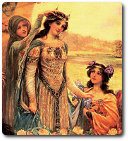Tess of the d'Urbervilles Contents
- Social / political context
- Religious / philosophical context
- Chapters 1-9
- Chapters 10-19
- Chapters 20-29
- Chapters 30-39
- Chapters 40-49
- Chapters 50-59
- Tess as a 'Pure Woman'
- Tess as a secular pilgrim
- Tess as a victim
- The world of women
- Tess as an outsider
- Coincidence, destiny and fate
- Disempowerment of the working class
- Heredity and inheritance
- Laws of nature vs. laws of society
- Modernity
- Nature as sympathetic or indifferent
- Patterns of the past
- Sexual predation
- Inner conflicts: body against soul
Chapter 32
Synopsis of chapter 32
Tess is reluctant to set a date for the wedding. She would prefer an indefinite engagement. But Angel presses her, reminding her that Crick will no longer need her services during the winter, as the cows are calving and their yield decreases anyway. Finally they settle on New Year's Eve.
It seems that Angel has no definite plans for the immediate future beyond taking their honeymoon in a former d'Urberville mansion nearby. He orders a wedding outfit for Tess, and arranges a marriage licence for what will be a very private wedding. Tess asks for further advice from her mother but receives none.
Commentary on chapter 32
For the first time, we see that the dairy community is not stable at all, but transient. Workers move on as the supply of milk lessens in winter. Tess is caught up in this movement, despite wishing time to stand still.
some arable farm: that is, a farm where crops are grown, and so there would be some need for picking winter crops, weeding and light farmwork. This is, in fact, where Tess does end up.
my property: although Angel may be being ironic, for much of the nineteenth century, wives were regarded as property, and as such could not own any themselves. The Married Woman's Property Act came into force in 1870.
common outdoor man: farm labourer
fatalistic convictions common to field folk: Hardy stresses the deterministic outlook of country people (see Determinism and free will).
journeying to towns and inns: typically, nineteenth century honeymoons consisted of a tour, staying a few nights in inns at each place visited.
banns...licence: The Church of England requires an announcement about an impending wedding to be made publicly in church for the three Sundays before it is due to take place. This is so that anyone who wishes to can object to it. These announcements are called banns, and in a village community, would afford maximum publicity. If a wedding licence is obtained from the Bishop, there is no need for the banns to be read, and so a wedding could be done quite privately. In general, weddings used to be much  smaller affairs than they are today.
smaller affairs than they are today.
mother's ballad: the traditional ballad tells of a dress, brought to King Arthur's court, that would change colour when put on by a woman who had been unfaithful. This happened to Queen Guinevere, whose adultery with Sir Lancelot was thus discovered.
Time
We move into November. The cows are beginning to calve and are taken away to a separate farm to give birth. Nevertheless, Hardy draws our attention to the light and the fertility in the land still present at the beginning of winter.
Place
Anglebury: Wareham
Sandbourne: Bournemouth, a rapidly growing resort, and another source of the dairy's profitability
Wellbridge: Wool
Vocabulary
advanced: i.e. in pregnancy
bolting: to sift flour through a sieve or cloth
bucolic: rustic, pastoral
butter-pat: individual portion of butter
vociferation: giving voice to
Investigating chapter 32
- Look at the paragraph beginning 'The meads were changing now...'
- What is the symbolism in the landscape?
- How in particular is Tess symbolised in the gnats?
- Gather words and phrases that describe Tess' state of mind in this chapter.
- What tensions or conflicts are evidenced?
- What particular state seems predominant?
- Does this correspond to her emotions?
- To what extent does Tess seem a free agent?
- What are her deepest fears?
- How are they expressed?
- Does Angel seem as ideal a lover to you as Tess thinks he is?
- How practical is Angel being?
- Angel seems to be making Tess an educational project. What does this say of his attitude to her?
- Explain the phrase: 'been made to miss his true destiny through the prejudices of his family'.
- Is Angel being fair here?